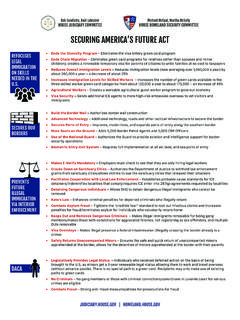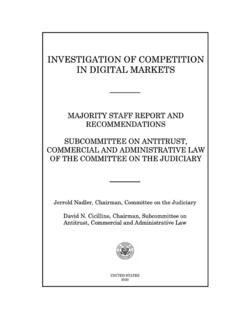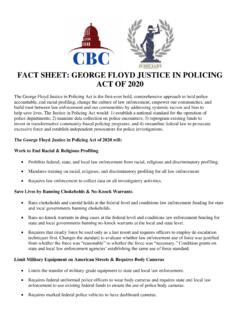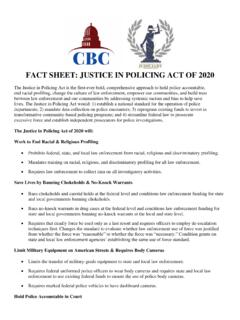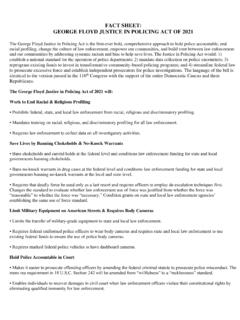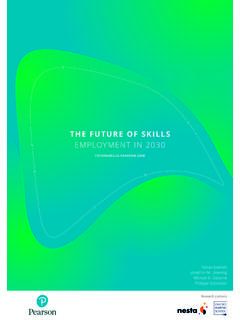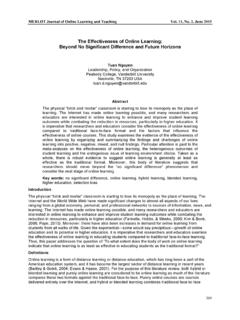Transcription of Immigration Provisions Build Back Better Act
1 Prepared by House Judiciary Committee Democratic Staff | TW: HOUSEJUDICIARY | FB: HOUSEJUDDEMS | IG: HOUSEJUDDEMS 1 Immigration Provisions Build Back Better Act Immigration reform including a pathway to permanent residence has long been a key priority for the Democratic caucus. The House Judiciary Provisions for the Build Back Better Act which included such a pathway for Dreamers, temporary protected status (TPS) recipients, and essential workers reflected that commitment. Section 60001 of the amendment in the nature of a substitute retains that commitment but instead of creating a separate pathway to lawful permanent resident (LPR) status for specific classes of individuals under a new section 245B of the Immigration and Nationality Act (INA), we are amending section 249 of the INA also known as registry. Why are we moving forward with registry?
2 It still provides a pathway to permanent residence for millions of Dreamers, TPS recipients, and essential workers, but it is billions of dollars cheaper than section 245B, it has tougher criminal bars, and it has not been the subject of a formal ruling by the Senate Parliamentarian. Section 60001. Registry Background Registry is a provision in the Immigration and Nationality Act (INA 249) that gives the Secretary of Homeland Security the ability to register certain individuals who have resided in the United States for an extended period of time for LPR status. The registry provision was originally enacted in 1929 and has been updated 4 times over the past century. It was last updated by President Ronald Reagan in 1986, and currently provides individuals who have continuously resided in the United States since before January 1, 1972, the opportunity to apply for LPR status.
3 Section 60001 of the Build Back Better Act advances the registry date to January 1, 2010. It would therefore allow individuals who have continuously resided in the United States since before that date to apply for LPR status, if they pay a $1,500 fee and meet other legal requirements. The registry update only applies to individuals who have set down roots here those who have lived and worked in service to our communities for more than 11 years. Estimates indicate that million individuals would be eligible for registry under the Build Back Better Act. This includes: o million Dreamers; o 360,000 TPS recipients; and o million essential workers, including 1 million farm workers. Prepared by House Judiciary Committee Democratic Staff | TW: HOUSEJUDICIARY | FB: HOUSEJUDDEMS | IG: HOUSEJUDDEMS 2 Bars to Eligibility for Registry The bars to eligibility for registry are similar to 6 in that they strike the right balance between tough and fair.
4 In addition to continuous residence, applicants for registry must show that they are not inadmissible under criminal or national security grounds, that they are not ineligible for citizenship, and that they possess good moral character (GMC). An individual is permanently barred from establishing GMC (and is thus permanently barred from registry) if they have been convicted of an aggravated felony a term broadly defined in the INA to include murder, rape, sexual abuse of a minor, robbery, trafficking, crimes of violence, fraud, racketeering, and more. However, registry also reflects our inherent belief in second chances a person who is conditionally barred from establishing good moral character based on less serious past conduct may be able to cure the problem over time by showing evidence of rehabilitation and other positive factors. Registry is Not Amnesty No matter how many times Republicans may say it, Registry is not amnesty.
5 First, registry applies to any noncitizen who has continuously resided in the United States for the requisite period of time, including those who have continuously maintained lawful status such as the thousands of high-skilled and other employment-based immigrants who are stuck in the endless visa backlogs. Second, the same 1986 legislation that updated the registry date to 1972 also included a separate legalization program for individuals who entered the United States before January 1, 1982. That legalization program only applied to individuals who are undocumented and that is the Reagan amnesty that Republicans keep talking about. Registry has nothing to do with legalization. If registry was amnesty why would Congress choose to update the registry date while simultaneously enacting a legalization program for undocumented individuals? The answer is simple they wouldn t.
6 Because registry is not legalization and it is not amnesty. Senate Parliamentarian Ruling on Immigration After the Judiciary Committee markup, The Senate Parliamentarian ruled that the reported language (section 245B) would be subject to a point of order on the Senate floor. The Parliamentarian s opinion was based in part on her view that section 245B was a broad new Immigration policy that created a new pathway to LPR status for specified classes of individuals. Prepared by House Judiciary Committee Democratic Staff | TW: HOUSEJUDICIARY | FB: HOUSEJUDDEMS | IG: HOUSEJUDDEMS 3 Contrary to the belief of some, the Senate Parliamentarian has not issued an opinion on registry. Many of the Parliamentarian s stated concerns regarding section 245B are addressed by amending the registry date. Registry is not a new program it does not create a new pathway to LPR status that does not exist under current law.
7 Individuals who apply for registry under the Build Back Better Act will need to satisfy the same eligibility criteria that all other registry applicants must satisfy and that were updated as recently as 1996. That year, Congress enacted the Illegal Immigration Reform and Immigrant Responsibility Act (IIRIRA) and made individuals who are deportable for terrorist activities ineligible for registry. As many of our nation s top economists have confirmed, the economic benefits of Immigration are substantial and uncontroverted. We are confident that the budgetary effects of registry substantially outweigh the policy implications and we anticipate a formal ruling from the Parliamentarian on this provision in the near future . Other Immigration Provisions The Judiciary Committee Provisions also include legislative changes that will help family-based immigrants contribute to their communities and the economy more swiftly and help companies attract and retain highly skilled workers.
8 This will further strengthen our economy, our competitive advantage, and our position as a global leader in innovation. Visa Recapture According to the most recent data from the Department of State, there are currently about 4 million individuals waiting in the family-sponsored immigrant visa backlog and nearly 1 million individuals waiting in the employment-based immigrant visa backlog. Sec. 60002 amends the INA to prevent future loss of unused employment-based visas and ensure that they roll over to the family-based categories in subsequent years as Congress intended. This section also recaptures unused immigrant visas from 1992 through 2021 and would result in the recapture of o Approximately 222,000 unused family-sponsored visas; and o Approximately 157,000 employment-based visas. Sec. 60002 would also allow an estimated 40,000 individuals who were selected for the diversity visa lottery and completed certain steps but were unable to finalize the process or enter the United States due to various executive orders or COVID-related office closures and restrictions, to reapply for such visas.
9 Enhancements to Green Card Processing Sec. 60003 allows an individual who is in the United States and eligible for adjustment to LPR status but for the lack of an available visa number to apply for adjustment, upon paying a fee. This will allow individuals to receive work authorization while they wait for a visa number to Prepared by House Judiciary Committee Democratic Staff | TW: HOUSEJUDICIARY | FB: HOUSEJUDDEMS | IG: HOUSEJUDDEMS 4 become available and will prevent dependent children from aging out of eligibility for LPR status. Sec. 60003 also allows immigrants who are in the United States to receive an exemption from the numerical limits on immigrant visas and adjust their status to LPR if their immigrant visa petition has been approved for 2 years and they pay a supplemental fee. Supplemental Fees Sec. 60004 establishes additional supplemental fees attached to applications and petitions for Immigration benefits, including visas and certain entry documents.
10 Funding for Citizenship and Immigration Services Sec. 60005 appropriates $ billion to Citizenship and Immigration Services in fiscal year 2022, to remain available until expended, for purposes of adjudicating application described in sections 60001 and 60003 and to reduce case processing backlogs. Economic Benefits of the Immigration Provisions in Build Back Better In a letter to the House and Senate leadership and Budget Committee Chairs, more than 50 economists and scholars, including President Obama s top economic adviser Jason Furman, underscored that a path to LPR status would increase wages and productivity throughout the economy, create jobs, generate additional tax revenue, strengthen worker protections for immigrant and native workers alike, and lift many families out of poverty. Immigrants are innovators, job creators, and consumers with enormous spending power that drives our economy and creates employment opportunities for all Americans.
